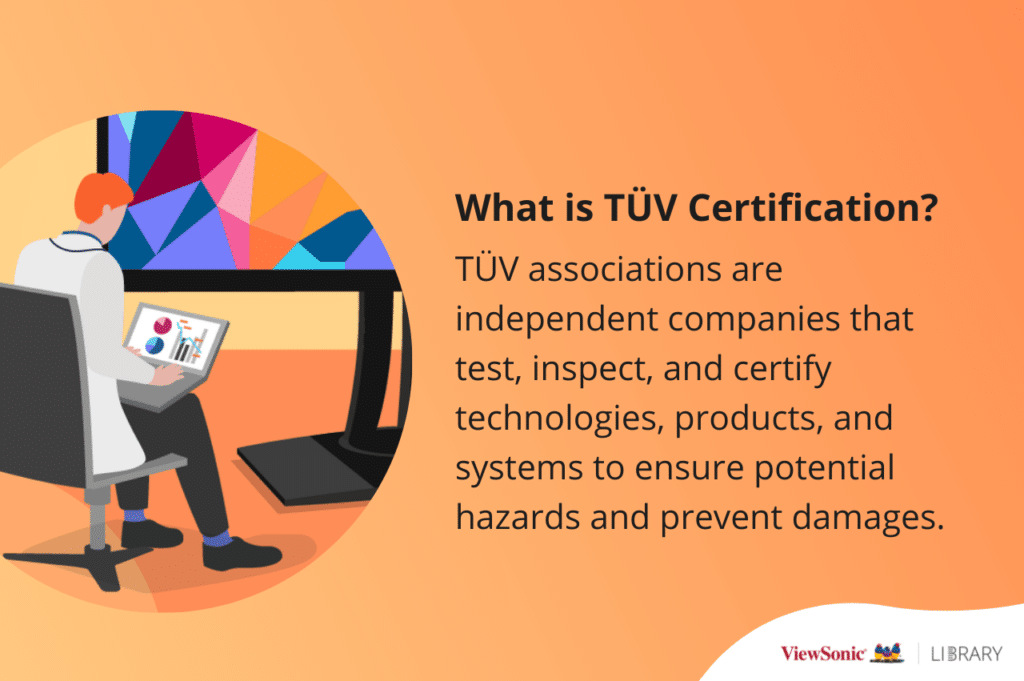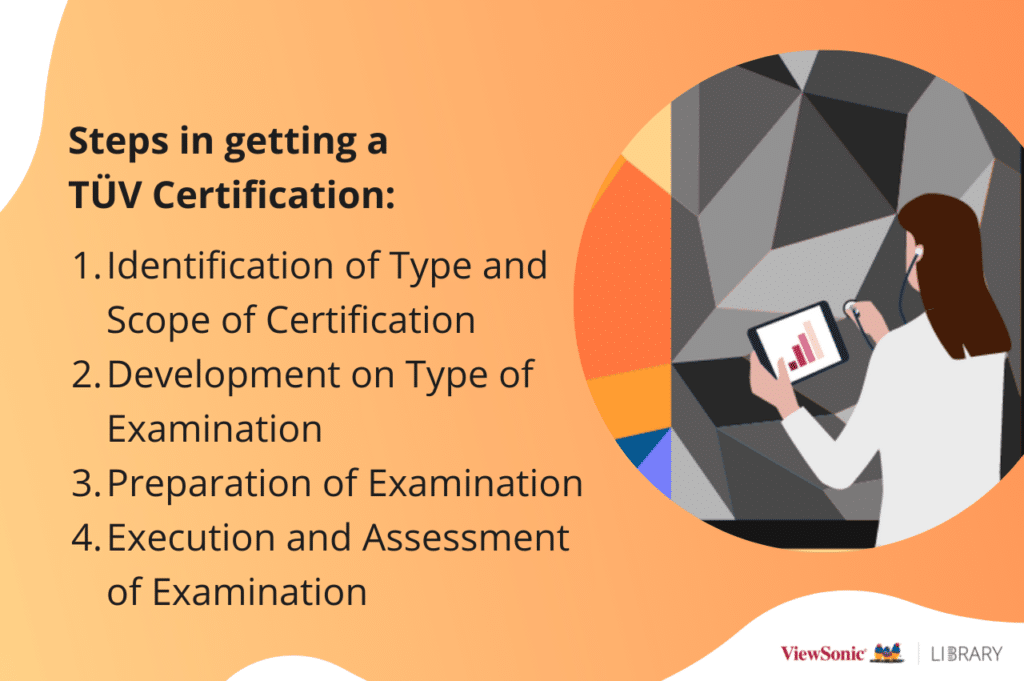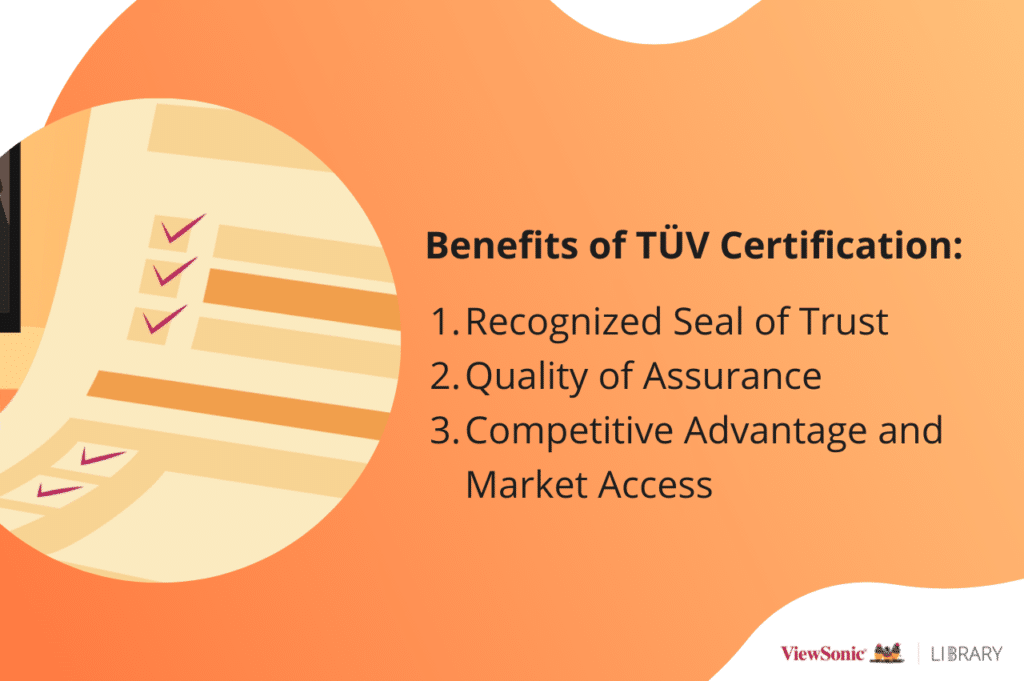Product certification is an essential process that helps ensure products, solutions, and services comply with safety regulations and quality criteria based on international standards. Businesses must routinely verify their products are fit for use and such certification is usually performed by third-party accreditation organizations.
Continue reading to find out why TÜV certification is important for products and services, and what benefits it can bring to your company. You can also learn more about ViewSonic’s partnership with TÜV SÜD on our ColorPro™ monitors.
Most countries are represented by a single accreditation body, which will administer the certification program to meet existing regulations. Some standard-setting bodies include CSA in Canada, CE in the European Union, FCC in the United States, and TÜV in Germany. Although its origin is from Germany, the TÜV is internationally recognized as a seal of utmost quality and is a mark that many companies strive to achieve.
What is TÜV?
TÜV is short for Technischer Überwachungsverein in German, which means Technical Inspection Association. These associations are independent companies that test, inspect, and certify technologies, products, and systems to ensure potential hazards and prevent damages.
During the Industrial Revolution in Germany, the idea of an independent technical review was established after an accident of a steam boiler. As more machines were introduced into the workforce in those times, there was a need to ensure the equipment and systems were safe for workers and consumers alike. The TÜV was then created to test, review, and regulate products and technologies to prevent accidents and eliminate defects.

Probably most known for automobile safety inspections in Europe, TÜV companies also overlook several key industries such as energy, infrastructure, medical, manufacturing, technology, and consumer products. Major organizations include TÜV SÜD, TÜV Rheinland, TÜV Nord, TÜV Saarland, TÜV Hessen, and TÜV Thüringen.
What Does TÜV Product Certification Mean?
Highly recognized worldwide as a trademark of trust and quality, a TÜV certification ensures that a product, service, or process has been tested for safety and that it complies with the requirements of national, regional, and international regulations. It assures consumers that the product has been checked thoroughly for any defects or potentially dangerous materials.
What is the TÜV Certification Process Like?
The entire process to achieve TÜV certification is a comprehensive journey that involves multiple steps. It always involves the identification of statutory regulations, assessment of qualified trainers, selection of methodology and examination approach, and development of examinations with expert examiners in their fields.
Depending on what is needed, the TÜV organization works with companies in the following steps:
Identification of Type and Scope of Certification
With international and statutory regulations in mind, the TÜV will look at the most suitable methodology to approach the certification. They will also assess if the content is sufficient or if the trainers need to be qualified for the exercise.
Development on Type of Examination
After the scope has been decided on, the TÜV will develop ideas on the examination and its process, its target qualifications of test subjects, the questions to be asked, assessment criteria, and the required examination committee.
Preparation of Examination
Next, the TÜV will plan the logistics of the examination, including dates and locations, and set clear regulations for the test. Test subjects will also be verified to ensure that they fit the examination’s scope.
Execution and Assessment of Examination
Lastly, the examinations will be carried out and supervised by the TÜV and their selected committee. Once the tests are completed, the results will be assessed and certified that they have met the standards laid out in the beginning.

For example, in the case of ViewSonic’s cutting-edge Color Blindness feature in monitors, the technology was to enable users with color vision deficiency (CVD) to identify and visualize color more accurately. TÜV SÜD identified CVD test subjects using the Munsell 100 Hue Test, and they then tested the monitor and color blindness software to ensure that the technology was reliable and safe.
When the product or solution goes through a series of rigorous tests, examiners will ascertain reliability, evaluate product characteristics including safety and quality, and discover faults and any potential health hazards. They also make sure that the latest environmental standards such as banned chemicals and optimal energy conservation are met.
What are the Benefits of TÜV Certification?
Achieving a TÜV certification is a long and laborious process. Despite so, many companies and organizations are willing to take the time and effort to undergo it as it brings them a whole host of benefits.
Recognized Seal of Trust
TÜV might have originated from Germany, but its brand mark is globally recognized as proof of competence and reliability. As an independent association, they are an unbiased and credible authority when it comes to testing and certifying.
Quality of Assurance
Achieving a TÜV certification means your company’s products have attained the requirements of safety, quality, and sustainability. This gives resellers and partners the confidence to work with you and consumers the peace of mind to use your products.
Competitive Advantage and Market Access
Working with a TÜV organization offers you access to a global network and database of knowledge and technology. With their shared expertise, your products can be regulated with protocols based on safety and quality requirements worldwide. This reduces the effort and time needed for approvals in different countries, giving you the edge over your competitors when you enter brand new markets.

How do You Check on a TÜV Certification?
Every TÜV certification has its unique identification number. Any individual, whether a corporate entity or a consumer, can go online to the specific TÜV approving organization, whether it’s TÜV Rheinland or TÜV SÜD, and key in the relevant certificate number, product module, or license holder to view and verify test reports, certification marks, and validation period. The certification is routinely audited once a year or two to ensure that the product or solution remains safe and good for usage.
Final Thoughts: Is TÜV Important?
Consumers are becoming more well-read about trends, technology, and market practices, and prefer buying from companies that are transparent about their processes and what goes into their products. It is essential to gain and maintain that trust between your company and your target market. In that sense, TÜV certification is an important way to garner that mark of quality, distinction, and reliability.
When your product is certified by a TÜV organization, it reflects well on your company as industry partners and consumers will recognize your pursuit of innovation and safety. It serves as proof of competence and responsibility, giving buyers assurance of quality. A TÜV partnership also offers your employees expertise and training, improves the overall quality of your products and services, and delivers insights on industry and sustainability trends.
The TÜV certification is an important recognition for your company to gain trust from consumers and partners across different markets. It puts you at the forefront of technology, making sure your products deliver features that are inclusive, safe, and relevant. Discover our ColorPro™ monitors engineered with TÜV SÜD-certified Color Blindness Mode.